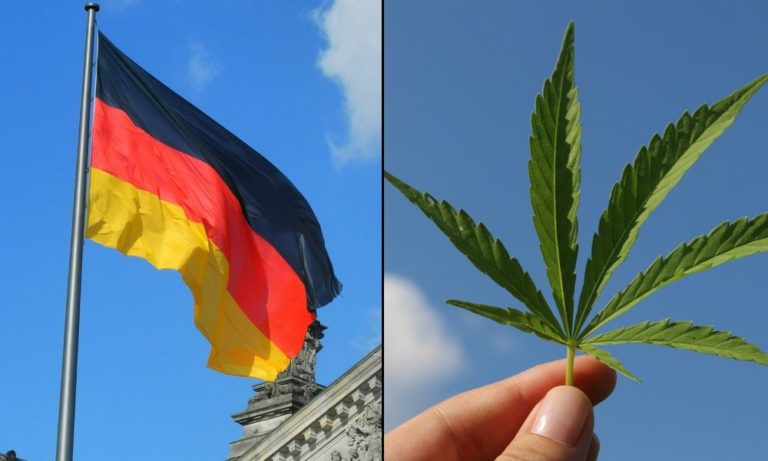
[ad_1]
German officials are convening a multi-national conference where leaders will share their experiences with legalizing and regulating marijuana, with a focus on public health and mitigating the illicit market. At the same time, however, certain parties within Germany are pushing to overturn the country’s recently enacted cannabis legalization law.
Representatives from Luxembourg, Malta, the Netherlands, the Czech Republic and Switzerland were invited by German Commissioner for Addiction and Drug Issues Burkhard Blienert to the meeting in Berlin on Monday and Tuesday to “exchange experiences in regulating cannabis for non-medical purposes.”
This is the third year in a row that the European nations have held a marijuana-centered “international ministerial.” And it comes as Germany continues to implement its own legalization law that took effect in April, with plans to eventually expand to allow a commercial market pilot program.
The focus of the meetings this week “is on the first experiences with the regulation of cannabis for non-medical purposes as well as the topics of prevention and evidence,” a press release from the ministry says, according to a translation.
“Despite decades of prohibition and criminal prosecution, cannabis was and is one of the most commonly consumed psychoactive substances in Europe and worldwide,” Blienert said. “Its availability, use and—due to the ever-increasing THC content—its danger to health have steadily increased over the last decade. It was clear that something had to happen.”
Wir haben mit dem #KCanG auch europaweit einen völlig neuen Weg eingeschlagen. Jetzt ist wichtig, zu evaluieren und den Austausch mit gleichgesinnten Staaten zu festigen. Ich habe deshalb ministerielle VertreterInnen aus CHE, CZE, MLT, NLD, LUX eingeladen: https://t.co/HK6OQxapeQ pic.twitter.com/j3WTDRXc85
— Sucht- und Drogenbeauftragter der Bundesregierung (@BdB_SD_Blienert) November 18, 2024
“I am sure that through evidence-based prevention, increased education and the decriminalization of home cultivation implemented in Germany with the Consumer Cannabis Act, we will succeed in reducing the health risks associated with the consumption of cannabis for non-medical purposes to a considerable extent,” he said. “We will also significantly reduce the illegal trade.”
“As optimistic as I am, I would like to stress one thing: we are entering new territory. And that is why it is important to evaluate all steps comprehensively and to establish a close exchange of experience with all other European states that have taken or will take comparable steps. That is why I have invited you to Berlin this week.”
As German officials have been working to implement their own cannabis law, however, lawmakers debated the policy on the floor of the Bundestag last week, with conservative parties pledging to overturn the reform if they win a majority following an election that is expected in February amid the collapse of the country’s governing coalition.
Kristine Lütke of the Free Democratic Party (FDP) called the effort by the Christian Democratic Union and the Christian Social Union “absurd and out of touch with reality.”
1/ Heute setzt die CDU/CSU ein einziges Thema auf die Tagesordnung: Cannabis. Während unsere Wirtschaft schrumpft und dringend einen Turnaround braucht, beschäftigt man sich mit ideologischen Angriffen auf Konsumenten. Absurd und an der Realität vorbei.
— Kristine Lütke MdB (@kristine_lutke) November 15, 2024
Green MP Kirsten Kappert-Gonther said that the conservative faction “has an irritatingly obsessive relationship to the topic [of] Cannabis.”
“One thing is clear: Decriminalization was long overdue Legal alternatives to the black market protect consumers and increase safety,” she said. “What is needed now are licensed specialist shops instead of bans!”
Die Union hat ein irritierend obsezessives Verhältnis zum Thema #Cannabis
Dabei ist klar:Die Entkriminalisierung war überfällig
Legale Alternativen zum Schwarzmarkt schützen Konsumierende u erhöhen die Sicherheit
Was es jetzt braucht, sind lizensierte Fachgeschäfte statt Verbote!— Kirsten Kappert-Gonther (@KirstenKappert) November 15, 2024
Federal Health Minister Karl Lauterbach, who spearheaded the legalization push in Germany, said the country “fundamentally changed our drug policy on cannabis, and the law “deserves a chance” to be implemented.
„Wir haben unsere Drogenpolitik bei #Cannabis grundsätzlich geändert: Weg von Verboten, hin zu #Aufklärung und mehr Sicherheit. Dieses Gesetz hat eine Chance verdient“, sagte @Karl_Lauterbach im #Bundestag bei der Aktuellen Stunde zum Cannabis-Gesetz. pic.twitter.com/3x09OJldI5
— Bundesgesundheitsministerium (@BMG_Bund) November 15, 2024
Meanwhile, the countries that are participating in the ministerial have varying cannabis policies. Malta, for example, became the first European country to enact cannabis legalization in 2021. Luxembourg followed suit, with the reform officially taking effect last year.
Government officials from several countries, including the U.S., also met in Germany last November to discuss international marijuana policy issues as the host nation works to enact legalization.
A group of German lawmakers, as well as Blienert, separately visited the U.S. and toured California cannabis businesses in 2022 to inform their country’s approach to legalization.
The visit came after top officials from Germany, Luxembourg, Malta and the Netherlands held their first-of-its-kind meeting to discuss plans and challenges associated with recreational marijuana legalization in 2022.
A novel international survey released in 2022 found majority support for legalization in several key European countries, including Germany.
Meanwhile, the United Nations (UN) drug control body recently reiterated that it considers legalizing marijuana for non-medical or scientific purposes a violation of international treaties, though it also said it appreciates that Germany’s government scaled back its cannabis plan ahead of the vote.
[ad_2]
Source link
